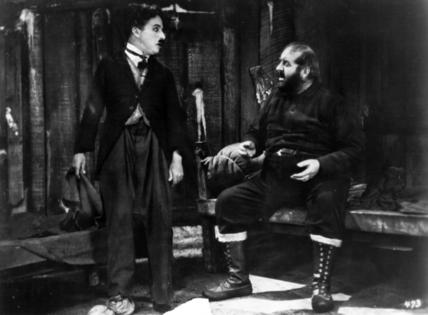Commentary: Charlie Chaplin's 100-year-old film 'The Gold Rush' has timeless lessons on how to keep going
Published in Op Eds
The wisest among us realize that what we normally think of as opposites are also associates. There’s life and death, joy and pain, fulfillment and absence. And, as Charlie Chaplin understood, and helped millions to understand, comedy and tragedy.
Cinema was about a quarter of a century old when Chaplin’s “The Gold Rush” premiered June 26, 1925. The medium had produced its share of masterworks to stand the test of time, and Chaplin himself was already a major star, synonymous with the very concept — even the philosophy — of comedy. But the likes of “The Gold Rush” were new. As William Shakespeare had once taught people about being human, here was Chaplin to enlighten viewers on what laughter could mean.
The picture features Chaplin’s Little Tramp character, as indelible a symbol of our collective pop culture consciousness as Walt Disney’s Mickey Mouse, Bela Lugosi’s Dracula, a can of Coke and Elvis Presley’s swiveling hips. His thesis: Pain halts us if we don’t also find a reason to laugh, and with that reason, we become better equipped to find solutions.
At 95 minutes, “The Gold Rush” was the longest comedy film to date. It riffs on, of all tragic things, the Donner Party, those poor, stranded souls who had to eat each other. There’s probably a metaphor in this — misery feeds on misery, which is why we spend so much time hate-reading and doomscrolling. The Tramp tries to strike it rich in Alaska during the Klondike gold rush with his eternal optimist of a pal, Big Jim. The Tramp is a thinker and an observer and not one to rush headlong.
Still, life has a way of catching us up in a snowball that becomes bigger and bigger until we’re careening down a hill, feeling powerless. The Tramp falls for a dance hall girl named Georgia. This is one of the sweetest love stories in cinema. It’s about the opportunities we so often fail to make the most of because we’re caught up in other things, including standing in our own way.
We carp about how lonely we are and then ignore the person who reaches out to us with kindness, and hope, and instead assume that they’ll follow us on our social media platforms, without realizing we’re contributing to our own isolation.
A prospective ghosting in “The Gold Rush” results in an epiphany, but by then, the Tramp and Big Jim are themselves isolated in a snow-covered cabin, which becomes something of a mobile home. But they do not perish, and life goes on, as life always does. And later, when opportunity again presents itself, both the Tramp and Georgia know what to do with it.
Creating solutions can seem like an impossible task — that there’s nothing we might come up with or put into practice to change what we’re dealing with. But all favorable outcomes have a key element in common: The person kept going.
To stop is to have no chance of a solution, unless you’re banking on a deus ex machina, which isn’t advisable unless you happen to have a god for a patron.
Keeping going can be a daily 3-mile walk to clear your head during hard times. Or a “dry” month. Or being solicitous of our friends, because they also have things going on, and when we look in on others, we see within ourselves.
Keeping going is also abeyance. Don’t downplay the value of a holding pattern. The plane circles the airport until it’s cleared to land, and that may be part of your journey too. To keep going certainly entails finding a way to laugh — realizing that this awful thing additionally means that this not-so-awful thing is close by, because that’s how it works.
There are few comedies more human than “The Gold Rush,” which is really no older now — in the important ways — than it was in the time of Babe Ruth.
Apply a compress of its humor and its courage to your brow in your difficult times. It’s just what is needed to cool you down so that you can set to moving again and make a gold rush of your own with staying power and the invaluable abeyance — and conveyance — of humor.
____
Colin Fleming is the author of “Sam Cooke: Live at the Harlem Square Club, 1963,” an entry in Bloomsbury’s 33 1/3 series.
___
©2025 Chicago Tribune. Visit at chicagotribune.com. Distributed by Tribune Content Agency, LLC.

























































Comments